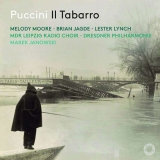 Giacomo Puccini: Il Tabarro; Melody Moore, Lester Lynch, Brian Jagde, Khanyiso Gwenxane, Roxana Constantinescu, Dresdner Philharmonie, Marek Janowski; 1 SACD Pentatone Classics PTC5186773; Liveaufnahme 03/2019, Veröffentlichung 11/2020 (49'42) - Rezension von Remy Franck
Giacomo Puccini: Il Tabarro; Melody Moore, Lester Lynch, Brian Jagde, Khanyiso Gwenxane, Roxana Constantinescu, Dresdner Philharmonie, Marek Janowski; 1 SACD Pentatone Classics PTC5186773; Liveaufnahme 03/2019, Veröffentlichung 11/2020 (49'42) - Rezension von Remy Franck
Puccinis Einakter Il Tabarro ist vor allem ein Stimmungsbild. Die Oper spielt 1910 in Paris, auf einem Schleppkahn am Ufer der Seine. Der Schiffer Michele liebt seine junge Frau Giorgetta, die jedoch eine Beziehung zum Löscharbeiter Luigi begonnen hat. Bei einem geplanten heimlichen Treffen auf dem Schiff wird Luigi von Michele überrascht und erwürgt. Michele wickelt den Toten in seinen Mantel. Als Giorgetta an Deck kommt, zeigt er ihr den Leichnam ihres Liebhabers…
Marek Janowski und der Dresdner Philharmonie gelingt es vorzüglich, Puccinis Musik evokativ und mit sehr transparenten Texturen lautmalerisch umzusetzen. Der Dirigent zeigt auch sehr gut die in die Zukunft weisende Färbung der Musik, ohne sie ihres Lyrismus und ihrer Emotionen zu berauben. Sein Dirigat zeugt von der Sorgfalt sowohl um das Detail als auch um den großen Bogen.
Melody Moore (Giorgetta) hat eine gute, klangvolle Stimme und sie singt auch sehr engagiert, um die Figur der Ehebrecherin glaubhaft darzustellen.
Der Bariton Lester Lynch ist stimmlich korrekt und kann auch darstellerisch überzeugen. Brian Jadge singt mit sicherer Tenorstimme ausdrucksvoll und kann die zerrissene Figur des Luigi ausfüllen. Er zeigt die Frustration des Löschers ebenso wie die Begeisterung des Verliebten.
Interessant finde ich aber insbesondere das Spiel des Orchesters, das auch von der Aufnahmecrew bevorzugt behandelt wurde, was sie kräftigen Stimmen zwar nicht benachteiligt, aber doch die Textverständlichkeit erheblich einschränkt.
Das Niveau der De Billy-Einspielung aus Wien (Pizzicato-Rezension) erreicht diese Neuaufnahme aber nicht.
Puccini’s short opera Il Tabarro is above all an atmospheric picture. It is set in Paris in 1910, on a barge on the banks of the Seine. The skipper Michele is in love with his young wife Giorgetta, but she has started a relationship with the young Luigi. During a planned secret meeting on the ship, Luigi is surprised and strangled by Michele. Michele wraps the dead man in his coat. When Giorgetta comes on deck, he shows her the body of her lover…
Marek Janowski and the Dresden Philharmonic Orchestra have succeeded in an excellent, evocative performance with very transparent textures. The conductor also shows very well the future-oriented colouring of the music, without depriving it of its lyricism and emotions. His conducting cares for details as well as for the overall architecture of the music.
Melody Moore (Giorgetta) has a good, sonorous voice, and she also sings with great commitment in order to portray the figure of the adulteress in a believable way.
The baritone Lester Lynch is a vocally and dramatically accurate singer. Brian Jadge sings expressively with a confident tenor voice, and perfectly portrays the torn figure of Luigi. He shows the frustration of the extinguisher as well as the enthusiasm of the lover.
At the end, I find the orchestra’s playing particularly interesting. It was clearly given preferential treatment by the recording crew, which does not disadvantage the strong voices, but does considerably limit the comprehensibility of the text.
The level of the De Billy recording from Vienna (Pizzicato review) is not matched by this new recording.






















